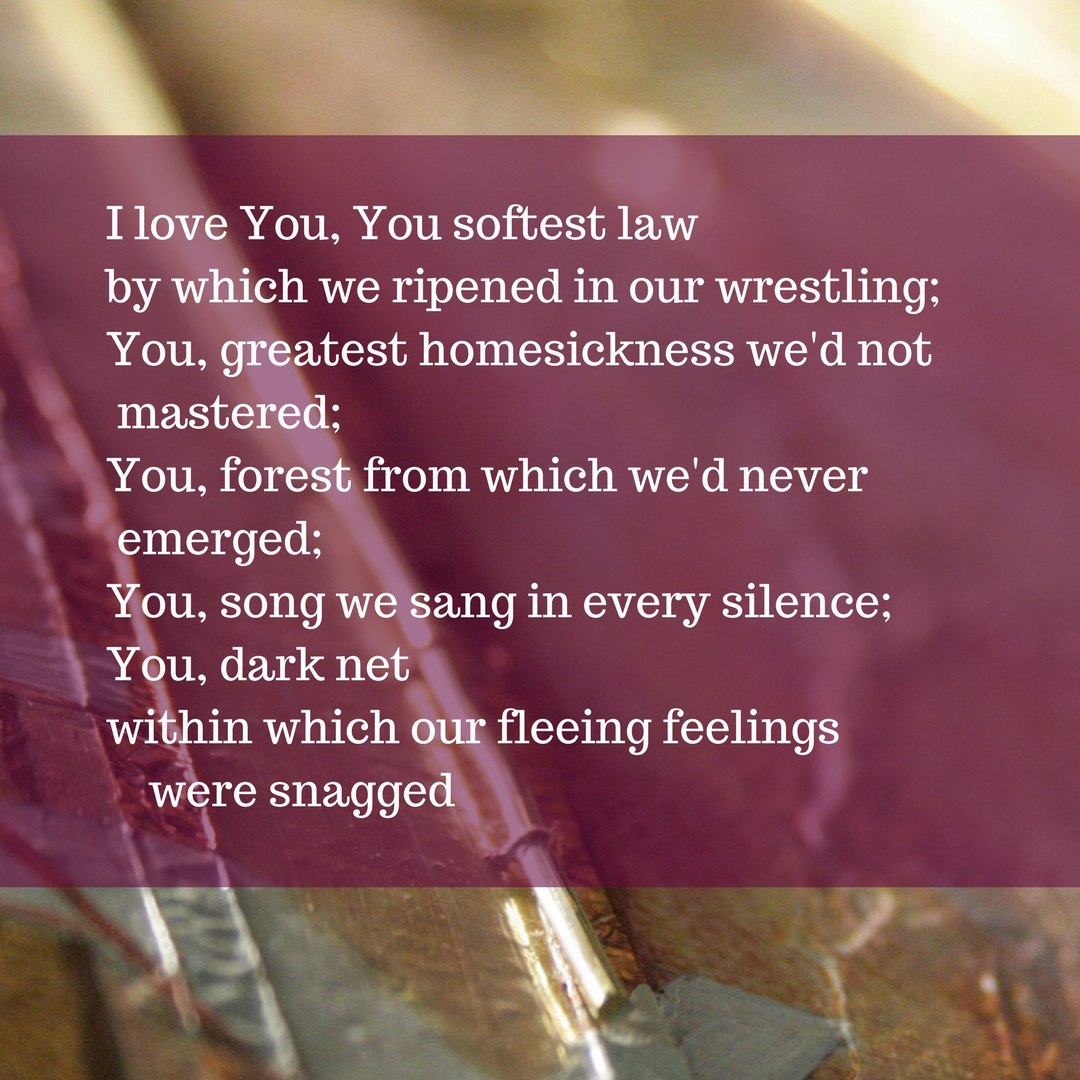In her marvelous recent collection of essays on poetry, Jane Hirshfield suggests that “the desire of monks and mystics is not unlike that of artists: to perceive the extraordinary in the ordinary by changing not the world but the eyes that look.” She goes on to describe how, in strong poems, “the inner reaches out to transform the outer, and the outer reaches back to transform the one who sees” (Ten Windows. How Great Poems Transform the World [New York: Knopf, 2015]). Poems carry the magic of transformation, bending the imagination in both directions—from inner to outer to inner, and back again. They change the way we learn to look, and thereby shape what we see. In turn, the “outer” world, by means of the leadings voiced in a good poem, reach into our inner being and change us, in large or subtle ways.
Rainer Maria Rilke wrote in a style that exemplifies this, his use of often startling and unexpected metaphors shifting something in the way we see, as if offering us glimpses of a world that alters the ways we look—and, thus, what it is we come to see in this world and in ourselves. One of these poems offers glimpses of God through a peculiar gathering of images, ones few of us might have imagined if left to ourselves but which, once we encounter them, might come to feel as intimate to us as our breathing. It begins this way:

The poem goes on to speak of how God stirs within us as we grow and change, “ripening” us in our journey, and above all in the struggles that will and do come, which Rilke alludes to with the pointed image of our “wrestling.” We find our lives deepened through feelings that might be discomforting, perhaps even a struggle, for us: viz., the experience of “homesickness”; wandering into a deep, dark forest; facing the silences that somehow, he suggests, might still invite us to song.
How is this to happen? Rilke refuses to say. His work as poet is not to tell us something, but rather to lure us: in this case, by awakening our vision with images that might initially strike us as strange and marvelous, as these surely are. Ours is the work of taking such metaphors into our musings, letting them come to work slowly on our inner way of seeing, inviting them to stir our imagination—which is the heart of what it means to “come to faith.” How a poem like this ignites our inner eye, and thereby alters how we look if not also how we live: this is the work of experiencing a good poem, taking us on a slow, meditative journey of coming to know. In engaging this “heart-work” (Herz-Werk), as he elsewhere calls it, we learn to take such images into the “deep” of our mind, coming to inhabit the outer world more perceptively and the inner world more knowingly. Through such images as these, as Ms. Hirshfield reminds us, “the inner reaches out to transform the outer, and the outer reaches back to transform the one who sees.”
God as the “great homesickness we’d not mastered”? An unsettling, even unorthodox image, at least at first glance. But no less a figure than the great theologian of Late Antiquity, Augustine of Hippo, said as much: “To praise You is what we desire, we who are but a fragment of your creation. You stir us to delight in praising You, because You made us for Yourself, and our heart is restless until it rests in You” (Confessions I.1; my translation). Rilke, of course, carries Augustine’s thought further, suggesting that what we experience in our unrest is the very presence of the divine within us—a remarkable insight, to be sure. And what a provocative and liberating invitation it offers, pointing to our struggles, our troubles and confusions, not as our problem but rather as the very hope of our “ripening.” Here, the poet suggests how we might claim our struggle as the root of our ripening—and how this might become for us a path into song, the kind we might learn to sing “in every silence.” Perhaps, along this inner path of the heart, we might even begin to attune ourselves to God the “net” who is wide enough to snare our “fleeing feelings.” To be caught in this net is to be freed into the deep of peace.